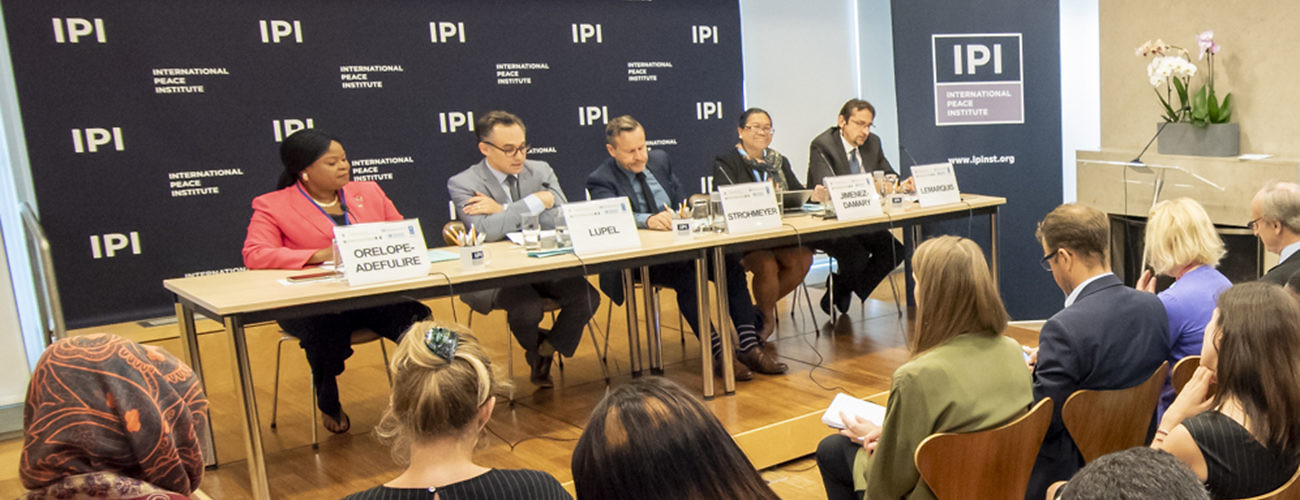Meeting the needs of Internally Displaced Persons (IDPs)—people who have been forced from their homes but are still within their national borders—is essential to the successful fulfillment of the United Nations Sustainable Development Goals (SDGs), participants at an IPI July 17th high-level event said.
“For many, many IDPs, once they enter displacement, and it’s multiple displacement; it’s a life sentence. It continues for the rest of their life. So what really is behind those 40 million is not only a humanitarian short-term need, it’s a very, very long-term developmental and political need…and that’s why it is very much an SDG conversation,” said Hansjoerg Strohmeyer, Policy Director at the UN Office for the Coordination of Humanitarian Affairs (OCHA). “It is very much an SDG conversation.”
May-Elin Stener, Deputy Permanent Representative of Norway, said the number of IDPs had now grown beyond 40 million, but “their plight has unfortunately taken a back seat in the policy debates that we have today, where refugees and migration flows raise concerns for a multitude of actors from member states and the UN to international human rights advocates and humanitarian organizations alike.” She stated, “Progress towards the SDGs will not be achieved if these people are not reached.”
In the UN Guiding Principles on Internal Displacement, published 20 years ago, IDPs are defined as “persons or groups of persons who have been forced or obliged to flee or to leave their homes or places of habitual residence…and who have not crossed an internationally recognized state border.” It specifies that this “movement is involuntary and takes place within national borders.”
Cecilia Jimenez-Damary, UN Special Rapporteur on the Human Rights of IDPs, asserted that the 2030 agenda is “highly relevant” to IDPs. She said that by giving them “ownership of their problems and agencies over their solutions, governments and organizations can ensure that IDPs have the freedom to be active in seeking recovery with dignity. And when participation is encouraged and sought out, it can even communicate their capacities and potentials for recovery.”
Pointing to why the 2030 agenda is key to the realization of durable solutions for IDPs, she focused on five particular sub-topics:
- Poverty, addressed by SDG 1; as well as hunger and food insecurity, addressed in SDG 2, are often the result of, or exacerbated by displacement
- Health care and education, which are the subjects of SDGs 3 and 4, are in many cases not accessible to IDPs or are insufficient to meet their needs;
- Employment and decent work, SDG 8, as IDPs often require assistance with access to employment, and face discrimination that SDG 10 also aims to reduce;
- Housing, since more and more IDPs are now residing in urban areas that require development under SDG 11, and more and more people are being displaced by climate change, addressed in SDG 13;
- Conflict and violence, responsible for the fact that 14 million people remain internally displaced, which relates to SDG 16 that promotes peaceful and inclusive societies.
Using the SDGs as a framework, she argued, “will help humanitarian and development actors to design, implement, and monitor solutions that are adaptive, responsive, effective, and sustainable.”
She mentioned the Inter-Agency Standing Committee (IASC) Framework on Durable Solutions for IDPs, which, she said was “particularly useful for helping to shape data processes that can enable the inclusion of IDPs in plans to achieve the SDGs.”
Victoria Adejoke Orelope-Adefulire, Senior Special Assistant to the President on SDGs in Nigeria, discussed the Nigerian government’s initiatives to respond to acute humanitarian needs in the northeast of the country, including through the creation of an advisory body, the Presidential Committee on the Northeast Initiative. This body is meant to streamline support to IDPs through holistic efforts backed by robust fundraising. She reminded the audience that Nigeria has six states affected by insurgency and highlighted that disaster especially affects the urban poor. Orelope-Adefulire also stressed the importance of a conflict-sensitive communications strategy in all humanitarian and development efforts across the northeast.
Ms. Orelope-Adefulire also focused on the dilemma for children, particularly in countries like Nigeria where insurgencies attract them. “You have a number of children orphaned by insurgency,” she said. In Nigeria, she said, “two projects were initiated to foster the children, as well as make sure that they have a good education. The government, through the office of the Vice President, has just completed phase one for the eight thousand young children housed and schooled in this particular place, and the second phase is ongoing…It is believed that all the children orphaned will be properly educated to be a fighter against incidents in future.”
Bruno Lemarquis, Director a.i., Crisis Response Unit, UNDP, argued that a “collective” response was necessary. “We need to work much more collectively, much more joined-up, working around collective outcomes to collectively reduce risk, vulnerabilities, and needs,” he said.
Emphasizing the linkage between the SDGs and policies that empower IDPs, Mr. Strohmeyer concluded, “There will be no solutions for sustainable development without looking at IDPs…the ambition of the SDGs is to reduce risk, need, and vulnerability. So for the humanitarian community, which has been working for many years to meet the needs, which is to meet the status quo, status quo is not enough. You need to reduce the vulnerability of these people, you need to reduce the need. That’s at the core of the SDGs, and that’s exactly what is necessary to move IDPs, in particular those protracted IDPs, out of their misery.”
Adam Lupel, IPI Vice President, was moderator.








